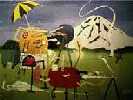 |

CSE 481 N - Natural Language Processing Capstone - Spring 2018 Lecture: TTh 10:00 - 11:20am in OUG 136 |
|
 CSE Home CSE Home |
| Personnel | Contact | Office Hours |
|---|---|---|
| Instructor: Yejin Choi | yejin at cs dot washington dot edu | Wed 4:30 - 5:30pm @ CSE 578 |
| TA: Ari Holtzman |
ahai at cs dot washington dot edu |
Mon 10 - 11am @ CSE 203 |
| TA: Nelson Liu |
nfliu at cs dot washington dot edu |
Fri 4-5pm @ CSE 220 |
| Week | Dates | Topic | Supplementary Material |
|---|---|---|---|
| 1 | Mar 27, 29 | Course overview & project pitch from xlab (Tue) AI2's guest lecture on Semantic Scholar by Waleed Ammar and Islam Beltagy (Thu) |
|
| 2 | Apr 3, 5 | AI2's guest lecture on
AllenNLP by
Mark Neumann and
Joel Grus (Tue) Yejin's research overview talk (Thu) |
|
| 3 | Apr 10, 12 | Project proposal presentations | |
| 4 | Apr 17, 19 | Guest lecture (Tue) Paper discussion I (Thu) |
|
| 5 | Apr 24, 26 | Project update presentations | |
| 6 | May 1, 3 | Project update presentations (Tue) Paper discussion II (Tue, Thu) |
|
| 7 | May 8, 10 | Project update presentations and demo | |
| 8 | May 15, 17 | Project update presentations and demo (Tue) Paper discussion III (Tue, Thu) |
|
| 9 | May 22, 24 | Project update presentations and demo | |
| 10 | May 29, 31 | Project update presentations and demo (Tue) Paper discussion IV (Tue, Thu) |
11 | June 7 | Finale! - final poster presentation & demo @ CSE atrium 11 AM - 1 PM |
| Week | Due | Milestones | Artifacts | Objectives |
|---|---|---|---|---|
| 2 | Apr 3 Tue | First blog post! | blog post #1 |
- Form a project group, make a team name. (the cooler the better!) - List top 3 project ideas your team is the most excited about, briefly outline the minimal viable action plan with stretch goals. - Start a github project and share the URL in your blog post. - Decide which project mode you want to be in: start-up mode (heavier focus on the coolness of the project and system development) or research mode (heavier focus on novel models, analysis, and insights). |
| Apr 5 Thu | Warm-up | blog post #2 | If you're (considering to be) on a deep learning track, install pytorch or tensorflow, get familiarized with pytorch/tensorflow APIs, download and run any existing codebase that can support your potential project, and tell us about your experience. If you don't want deep learning, that's totally cool too! Run any software that you either downloaded or wrote yourself that can be potentially useful for your project and tell us what you've been up to. | |
| 3 | Apr 10 Tue | Project Proposal | blog post #3 | Time to make a formal proposal! A good proposal should sketch out both the minimal viable action plan as well as stretch goals. Clearly state your project objectives, proposed methodologies, available resources, and the evaluation plan. Don't forget to include literature survey! |
| 4 | Apr 17 Tue | Strawman I | blog post #4 | Complete at least one strawman / baseline approach, run experiments, and set up the evaluation framework. |
| 5 | Apr 24 Tue | Strawman II | blog post #5 | Complete *multiple* strawman / baseline approaches, record their performance, plus perform *error analysis*. |
| 6 | May 1 Tue | Advanced model attempt #1 | blog post #6 | Time to make an advanced model attempt #1! Tell us what you tried, share any exciting results. If no good news, at a minimum tell us how you'd characterize the failure modes and what your team will investigate next. |
| 7 | May 8 Tue | Advanced model attempt #1 | blog post #7 | Continue making the advanced model attempt #1, run more experiments, do more error analysis, and sketch out the next action plan. |
| 8 | May 15 Tue | Advanced model attempt #2 | blog post #8 | Let's make an advanced model attempt #2! Tell us what you tried, how it went, and why it didn't work if it didn't work. |
| 9 | May 22 Tue | Advanced model attempt #2 | blog post #9 | Continue making an advanced model attempt #2, run more experiments, do more error analysis, and sketch out the final action plan. |
| 11 | June 7 Thu | Final Poster Presentation & Demo | Poster | Final poster presentation & demo @ CSE Atrium, 11 AM - 1 PM. |
| 11 | Jun 7 Thu 5pm | Final Project Report | 10 page report in pdf |